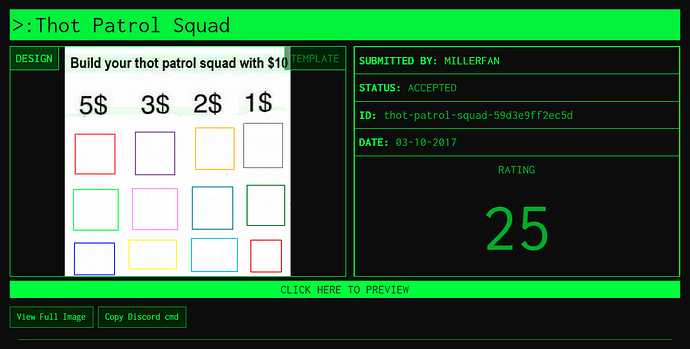Continuing the discussion from What impact is AI generated Art having on meme cultures?:
Botpages on Facebook and Twitter bots deserve their own thread. Also, the case of GPT-4chan deserves a special mention as a highly successful and well-documented bot account on 4chan.
The Bot Appreciation Society is a great community of bot appreciators and creators, founded in 2017. It has a Wikia site with over 400 pages:
The first successful Facebook botpage was Shitpostbot 5000, which produced memes by combining user-submitted templates and source images. Templates have designated regions into which source images are randomly added to in order to complete the meme. Here is an example:
The rectangles each designate the location for one source image; metadata is shown on the right. This template takes 12 source images, and has a pretty good rating (meaning users like it, so the template probably generates good memes more often than others).
Botpages on Facebook have tended towards template-based images whereas there seems to be more variation with Twitter bots, especially with the latter attracting more artistic and text-based bots (like poem.exe).
Now, machine learning memepages and groups are picking up on Facebook. This makes me wonder what the difference is between botpages and AI memepages.
The most straightforward distinction seems to be that botpages run on predetermined rulesets and AI memepages don't. This leads to botpages being a generate-and-sort activity where the bot produces and posts content at a regular interval (every half an hour in case of SPB5K), and the audience sorts them with help from the feed algorithm (more successful memes get more interactions, which boosts their reach). AI-generated memepages and groups are spaces where people share information about which ML models are the best for what, which prompts most reliably produce good results, and post the best output that they generated using the model. The sorting is done prior to posting; most interestingly, the rulesets are not predetermined but negotiated through a combination of users developing a "mechanical sympathy" for the AI and learning the "rules" of which keywords, syntax, word structures work the best.
It's striking that the way that people interact with botpages is similar to how people interact with memepages in the feed. The audience engages with the memes posted by memepages per se through discovery mechanics; feedback (e.g. the memepage admin sees what content is more popular, and readjusts their subsequent posts) is delayed for content creation but immediate for content distribution. On the other hand, people interacting with text-to-image ML models do so in a way that's similar to Googling. They have a lot more control over the output, as though they are using their text prompts to "search" through a database (it's of course not the case; and SEO ranking does enable crowd-sourced feedback and discovery influences for search engines). Nonetheless, it seems to me that AI-generated memes introduce a fundamentally, if not metaphysically, different mode of creative production online.
